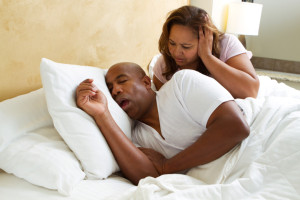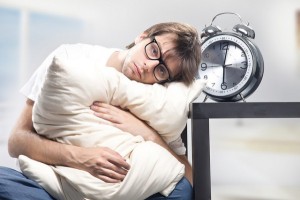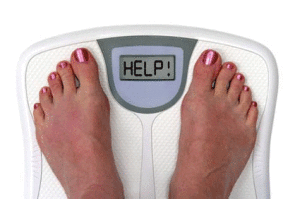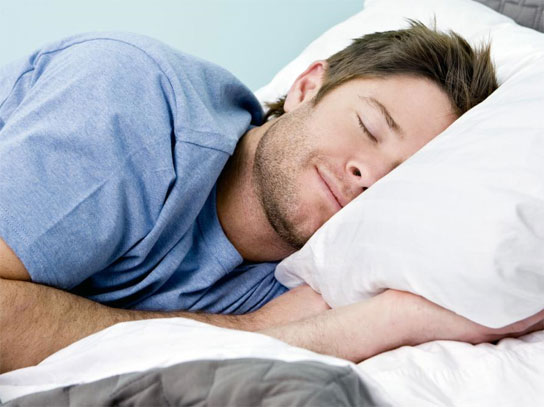What is Sleep Apnea?
Sleep apnea is an episode someone has in their sleep where they stop breathing temporarily or have short breaths during the night.
Pauses like this can last only a few seconds then in some people it can last for minutes. In more severe cases, this may happen 30 times or more in an hour.
Usually, regular breathing will start again after this period that is initiated with a loud snorting noise or choking sound.
Normally, sleep apnea is ongoing (happens every night) and you may not even know it, but your brain does!
It will cause you to move in and out of light to deep sleep, because the lack of oxygen, which can cause you to feel tired during the day. The leading cause for daytime sleepiness is sleep apnea.
Sleep apnea usually goes undiagnosed because it can’t be detected during a normal checkup at the doctor and the main symptom snoring is not taken seriously.
Most people do not even know they have it, and may never, unless their bed partner or someone notices it when they sleep.
Types of Sleep Apnea
Obstructive sleep apnea – the most common type of sleep apnea. It is obstructive sleep apnea (OSA) because the airway either gets blocked or collapses during sleep causing the pauses in breathing or short breaths.
When air is trying to squeeze by the blockage it can cause loud snoring.
OSA happens a lot more in people who are overweight, but it can happen to anyone, even children.
An example, is an enlarged tonsil causing blockage and the child is snoring.
Central sleep apnea – less common than OSA. Central sleep apnea (CSA) occurs when the brain does not send the correct signals to your breathing muscles to tell you to breathe.
In this case, you will not make any efforts to breathe causing your brain to make you wake up due to the lack of oxygen.
CSA can affect anyone just like OSA, but it is seen more in people that have other medical conditions or are on certain medications.
It is also possible that CSA can also cause OSA. Yet usually, CSA happens by itself and does not cause snoring or OSA.
Sleep Apnea Symptoms and Signs
Sometimes, the signs and symptoms of sleep apnea in both obstructive and central types coincide with the other making it difficult to diagnose one from the other or sometimes both.
Common Signs of Sleep Apnea
- Snoring – First and foremost, loud snoring which happens more with OSA. Pauses in breathing may occur randomly, followed by a choking noise or movement in sleeping positions to breathe again. Usually, the snoring is the loudest when you are laying on your back. BUT just because you snore don’t mean you have sleep apnea. So, don’t freak out!
- Partner Observation – Someone telling you that they were wondering if you were going to breathe again is a huge sign. If you are snoring and someone notices you stop breathing, this is a a real common sleep apnea symptom.
- Abrupt Waking – When you abruptly wake up with shortness of breath and/or sweating in the bed frequently.
- Dry Mouth/Sore Throat – When you wake up in the morning do you always have a dry mouth or sore throat? This can also be a sign.
- Headache – Waking up with a headache. Your brain is not getting the oxygen it needs and therefore you have a headache.
- Frequent Waking – Are you having trouble staying asleep all night? You may not realize it, but your brain is taking you in and out of deep sleep because the lack of oxygen and it can make you wake up over and over again.
- Daytime Sleepiness – Don’t freak out. We all can get tired during the day due to many reasons, but if it is excessive, it could be a sign. If you are going to bed the same time every night and getting 8-9 hours sleep, to your knowledge, and you still find yourself fighting sleep a lot during the day, then it may need to be looked into further.
- Lacking Focus – Having trouble paying attention during the day? Again, similar to daytime sleepiness, your brain may just not be operating on all levels due to lack of sleep and it causes focus problems.
- Irritability – Are you getting short/irritable with everyone? Lack of sleep can be a cause of irritability.
- Frequent Urination – Waking up a lot to pee during the night? Being you aren’t sleeping well, it can make your bladder a little more active with all the wake-ups.
- Short Term Memory – Find yourself forgetting things way more? This is a hard symptom of sleep apnea to identify because lets face it, the older we get it seems the more we tend to forget, but if you notice suddenly that you are tired more and just can’t remember the usual things you are used to remembering, it could be a sign.
- Libido Down – Not feeling frisky with your partner anymore? Not wanting to have sex is common in newly discovered sleep apnea patients.
Lots of these symptoms, if you haven’t figured it out yet, are symptoms from lack of sleep. Anyone who does not get the sleep they need can suffer from a lot of these.
Yet, if you believe to be getting the sleep you need and you are experiencing more than a few of these symptoms, it could be worth getting yourself checked out, or at the least, having someone watch you sleep for a while.
What Causes Sleep Apnea?
- Obesity – Probably the most common cause and most often guessed issue is weight. If you are overweight, you can increase your risks of having sleep apnea.
- Men – If you are a male, you are more likely to have sleep apnea than a woman is.
- Genetics – Sleep apnea can be hereditary, so if you know someone in your family with it, it could of been passed down to you.
- Age – If you are over the age of 50 you are more likely to develop sleep apnea.
- Race – If you are Black, Hispanic, or Asian you are more likely to have sleep apnea. According to records of diagnosed patients, more people of these races have sleep apnea.
- Smoking – You might want to try to quit or you may find yourself at a higher risk of sleep apnea.
- Exercise – Lack of exercise can cause all sorts of body levels to get out of sync including blood pressure. High blood pressure puts you at higher risk of having sleep apnea.
- Neck – Having a thick neck (having one 15.75 inches around), which can be related to being overweight, can put you at higher risk as well.
- Face/Skull – Other causes are physical attributes of the person such as a deviated septum, adenoids, enlarged tonsils, or receding chin (which are also the most common causes in children). Your throat muscles could be relaxing more than normal or allergies can cause sleep apnea related symptoms as well.
How to Treat Sleep Apnea?
Changes to make to your lifestyle
- Lose weight – When you are overweight you have more tissue in your throat which can be more that gets in the way of your airflow while you sleep. Even losing 5-10 lbs. can make a huge difference.
- Quit smoking – Smoking causes your throat to be more irritated and inflamed, therefore restricting airflow.
- Sleep schedule – Sleeping on a schedule reduces sleep apnea episodes
- Caffeine – Don’t drink caffeine or eat too much within 2 hours of bed time.
- Exercise –This helps more than just one thing, such as weight, but many other things such as high blood pressure that is related to causing sleep apnea. Exercise is also proven to help you sleep better which will reduce sleep apnea symptoms.
- No alcohol, sedatives, or sleeping pills – None of these before bed. These substances have proven to make the throat muscles relax too much which can block your airway.
Changes or tips when going to bed
- Keep nasal passages clear – If you have some allergy problems or just need to breathe through your nose better, try a saline spray, nasal dilator, neti pot, breathing strips, or humidifier to help you breathe more easily.
- Keep your mouth closed – If you find you are sleeping with your mouth open, try strengthening your jaw muscles by chewing gum or holding something in your teeth for 10-15 min. before bedtime. Chin straps can be used as well.
- Keep your head propped – Elevating your head at night can help airflow in your throat. It is best to elevate your bed if possible or elevate your body from the waist up. If you don’t, your neck will hurt!
- Keep it on the side – Sleeping on your side is one of the best ways to keep that air flowing correctly to your lungs. Gravity can make your tongue and throat tissue get in the way when you are on your back.
- Keep a ball in your back pocket – By keeping a tennis ball, for example, in your back pocket of your pajamas it will sub-consciously prevent you from rolling over to your back.
Do I need to see a doctor for sleep apnea?
Yes. If making changes to your sleep habits or lifestyle does not work, it is time to see a doctor about your problem. These are the treatments for sleep apnea they can provide:
- CPAP – You may need a breathing device to sleep with every night called a CPAP machine (continuous positive airflow pressure) and it is the most common treatment for sleep apnea. In short, it is a machine that makes air flow to the mask you wear while you sleep through your nostrils or mouth, depending on the type of mask, to make sure air is being pushed to your lungs and preventing the collapse. CPAP therapy has been around for a very long time and the advances in technology have made lots of these masks very comfortable to wear while you sleep.
- Oral Appliance – Another popular method for people who just really, really, don’t want to wear or try a cpap mask is by a dental device or dental surgery. Dentists can make a mouth piece called a mandibular repositioning device and a tongue retaining device. Both help do the same thing which is either keep your jaw in a specific location (mandibular) to allow more airflow or keep your tongue out of the way (tongue retaining). These devices must be fitted and made specifically for you. Oral appliances are only effective for mild to moderate sleep apnea patients. They will not work for more serious sleep apnea. Dentists have also been known to break and relocate the jaw in surgery to allow better airflow.
- Surgery – can also be a treatment if your ENT believes that your tonsils, adenoids, or too much tissue in the throat is getting in the way. These tissues/organs can be removed to cure sleep apnea, but again, only when this has definitely been singled out to be the problem.
- Implant – There are now sleep apnea implant devices that go just under the skin that attach to a nerve to help send signals to your mouth.
If any of these options do not sound like something you want to do, or you just hate cpap masks like lots of people do check out our cpap alternatives post with other sleep apnea treatment options.
Summing it Up
As you can probably see, there are many signs to look for in sleep apnea and along with the signs, there are many treatments.
If you think you have sleep apnea, don’t automatically think you are going to have to wear a mask the rest of your life.
In all honesty, there have been thousands of people that have fixed their sleep apnea by just changing their lifestyle habits a bit.
Yet, don’t expect it to go away if you are not willing to make any changes. If you try some of the methods mentioned above and you are still feeling the symptoms, then it is always best to go see a doctor and get their opinion.
Then, if need be, they can set you up on a sleep apnea test/sleep study to learn more about how you are sleeping at night.
The great news is that sleep apnea is well managed even when it can’t be cured permanently.
The bad news is that this disorder goes unnoticed more than almost any other disorder out there. We can only estimate how many people have sleep apnea.
Sadly, this can shorten your life due to causing all sorts of health problems or even someone else’s if you were to fall asleep behind the wheel for example.
Don’t be that person, and if you suspect, then it never hurts to get checked out!


